鲁滨逊漂流记的人物分析论文
英国文学毕业论文范文

英国文学毕业论文范文浅析《鲁滨逊漂流记》中的个人主义关键词:鲁滨逊漂流记个人主义人物思想摘要:在英国文学史上,十八世纪被认为是一个特殊的历史时期,因为在这一时期英国社会经济结构发生了巨变,工业革命爆发,导致了英国工业资本主义得到迅速发展。
工业革命不仅是一场经济变革,同时也是一场社会变革,引起了英国社会的全面变革。
改变了人们的经济地位,形成了新的社会阶级关系。
社会经济的发展给人们意识形态领域无疑产生了巨大的影响,人们开始抛弃传统,废除影响个人发展和个人独立思想形成的旧观念、旧模式和旧思维。
《鲁宾逊漂流记》中的个人主义在英国文学史上,十八世纪被认为是一个特殊的历史时期,因为在这一时期英国社会经济结构发生了巨变,工业革命爆发,导致了英国工业资本主义得到迅速发展。
工业革命不仅是一场经济变革,同时也是一场社会变革,引起了英国社会的全面变革。
改变了人们的经济地位,形成了新的社会阶级关系。
社会经济的发展给人们意识形态领域无疑产生了巨大的影响,人们开始抛弃传统,废除影响个人发展和个人独立思想形成的旧观念、旧模式和旧思维。
一个新型的经济和政治组织给其成员最大的自由来选择自己的行为,正是在这一大的社会背景下,一个新的名词“经济个人主义”诞生了。
这一思想促使了人们背离过去和社会传统规约,以自我为中心,张扬个性和挖掘能力,同时在宗教界,新教主义思想得到了广泛的传播。
为“经济个人主义”思潮推波助澜。
政治、经济和宗教界的种种变化在英国产生了轩然大波。
丹尼尔.迪福,这个被称为英国小说之父的伟大作家,用自己独特的写作方式记录了当时时代、社会和人们思想的变迁,其哲学观与17世纪经验派有着不谋而合之处,其小说也从各方面揭示了社会的“经济个人主义”思想,《鲁宾逊漂流记》就是这一思想得以表达的典型代表。
这部小说是迪福受当时一个真实故事启发而创作的。
1704年9月一名叫亚历山大.塞尔柯克的苏格兰水手在海上与船长发生争吵,被船长遗弃在南美洲大西洋中的按菲南德岛上,四年后当他被救回英国时已成了一个野人。
《鲁滨逊漂流记》主人公内心矛盾与冲突解析
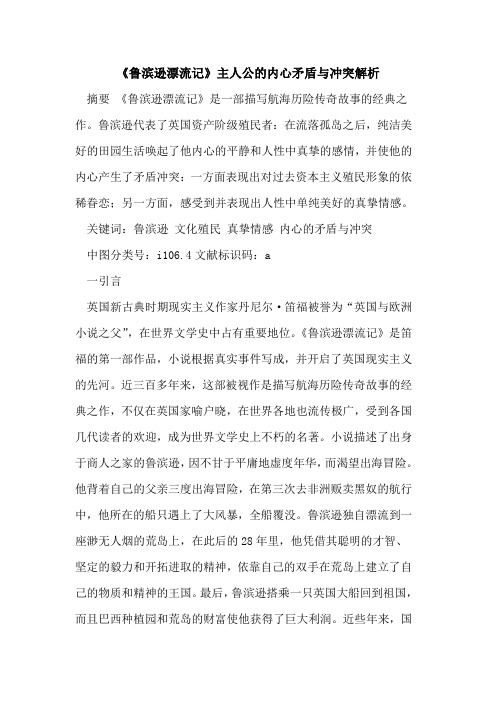
《鲁滨逊漂流记》主人公的内心矛盾与冲突解析摘要《鲁滨逊漂流记》是一部描写航海历险传奇故事的经典之作。
鲁滨逊代表了英国资产阶级殖民者:在流落孤岛之后,纯洁美好的田园生活唤起了他内心的平静和人性中真挚的感情,并使他的内心产生了矛盾冲突:一方面表现出对过去资本主义殖民形象的依稀眷恋;另一方面,感受到并表现出人性中单纯美好的真挚情感。
关键词:鲁滨逊文化殖民真挚情感内心的矛盾与冲突中图分类号:i106.4文献标识码:a一引言英国新古典时期现实主义作家丹尼尔·笛福被誉为“英国与欧洲小说之父”,在世界文学史中占有重要地位。
《鲁滨逊漂流记》是笛福的第一部作品,小说根据真实事件写成,并开启了英国现实主义的先河。
近三百多年来,这部被视作是描写航海历险传奇故事的经典之作,不仅在英国家喻户晓,在世界各地也流传极广,受到各国几代读者的欢迎,成为世界文学史上不朽的名著。
小说描述了出身于商人之家的鲁滨逊,因不甘于平庸地虚度年华,而渴望出海冒险。
他背着自己的父亲三度出海冒险,在第三次去非洲贩卖黑奴的航行中,他所在的船只遇上了大风暴,全船覆没。
鲁滨逊独自漂流到一座渺无人烟的荒岛上,在此后的28年里,他凭借其聪明的才智、坚定的毅力和开拓进取的精神,依靠自己的双手在荒岛上建立了自己的物质和精神的王国。
最后,鲁滨逊搭乘一只英国大船回到祖国,而且巴西种植园和荒岛的财富使他获得了巨大利润。
近些年来,国内不少评论家和研究者都从不同的角度对《鲁滨逊漂流记》进行了分析,其中大部分论述集中在:鲁滨逊作为当时资产阶级上升时期的一个典型的资产阶级开拓者和殖民主义者的形象研究;荒岛文学角度进行的分析;鲁滨逊宗教观的考察及其与清教思想关系的探讨等。
本文则重点研究鲁滨逊在荒岛生活期间内心所表现出来的冲突与矛盾,以便读者可以从一个崭新的视角去了解一个处在特定社会历史时期、独特生活环境中的鲁滨逊的内心世界。
二鲁滨逊内心的矛盾冲突鲁滨逊是资产阶级的开拓者和殖民主义者,他具有强烈的占有欲。
鲁滨逊漂流记的主要内容和读后感书中人物介绍
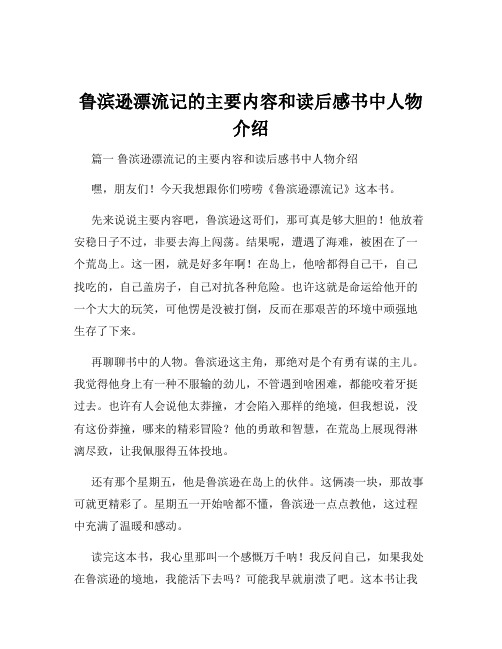
鲁滨逊漂流记的主要内容和读后感书中人物介绍篇一鲁滨逊漂流记的主要内容和读后感书中人物介绍嘿,朋友们!今天我想跟你们唠唠《鲁滨逊漂流记》这本书。
先来说说主要内容吧,鲁滨逊这哥们,那可真是够大胆的!他放着安稳日子不过,非要去海上闯荡。
结果呢,遭遇了海难,被困在了一个荒岛上。
这一困,就是好多年啊!在岛上,他啥都得自己干,自己找吃的,自己盖房子,自己对抗各种危险。
也许这就是命运给他开的一个大大的玩笑,可他愣是没被打倒,反而在那艰苦的环境中顽强地生存了下来。
再聊聊书中的人物。
鲁滨逊这主角,那绝对是个有勇有谋的主儿。
我觉得他身上有一种不服输的劲儿,不管遇到啥困难,都能咬着牙挺过去。
也许有人会说他太莽撞,才会陷入那样的绝境,但我想说,没有这份莽撞,哪来的精彩冒险?他的勇敢和智慧,在荒岛上展现得淋漓尽致,让我佩服得五体投地。
还有那个星期五,他是鲁滨逊在岛上的伙伴。
这俩凑一块,那故事可就更精彩了。
星期五一开始啥都不懂,鲁滨逊一点点教他,这过程中充满了温暖和感动。
读完这本书,我心里那叫一个感慨万千呐!我反问自己,如果我处在鲁滨逊的境地,我能活下去吗?可能我早就崩溃了吧。
这本书让我明白,人啊,有时候就得逼自己一把,不逼一逼,都不知道自己有多强大。
它也让我懂得,无论生活给你多大的难题,都要勇敢面对,别轻易放弃。
这一路读下来,真好!篇二鲁滨逊漂流记的主要内容和读后感书中人物介绍咱今天接着唠《鲁滨逊漂流记》,这书真的太精彩啦!主要内容嘛,鲁滨逊就像个不知天高地厚的愣头青,一头扎进大海的怀抱,然后被狠狠地扔在了荒岛上。
这荒岛可不是啥度假胜地,那是要啥没啥,生存都成问题。
可鲁滨逊这家伙,愣是没被吓倒。
他像个勤劳的小蜜蜂,到处找食物,自己动手造工具,盖房子,这过程中的艰辛,咱想想都觉得头疼。
也许有人会说,他这是自找苦吃,可我却觉得,这正是他的了不起之处。
说说人物,鲁滨逊这个人啊,有时候我都觉得他固执得要命。
但反过来想想,要是没这股子固执劲,他能在荒岛上坚持那么多年?他的那种决心和毅力,真的让我佩服得不行不行的。
鲁滨逊漂流记人物品质及事例
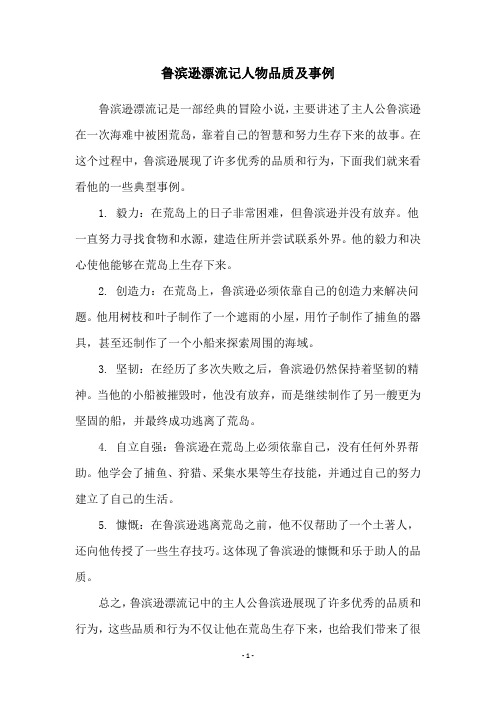
鲁滨逊漂流记人物品质及事例
鲁滨逊漂流记是一部经典的冒险小说,主要讲述了主人公鲁滨逊在一次海难中被困荒岛,靠着自己的智慧和努力生存下来的故事。
在这个过程中,鲁滨逊展现了许多优秀的品质和行为,下面我们就来看看他的一些典型事例。
1. 毅力:在荒岛上的日子非常困难,但鲁滨逊并没有放弃。
他一直努力寻找食物和水源,建造住所并尝试联系外界。
他的毅力和决心使他能够在荒岛上生存下来。
2. 创造力:在荒岛上,鲁滨逊必须依靠自己的创造力来解决问题。
他用树枝和叶子制作了一个遮雨的小屋,用竹子制作了捕鱼的器具,甚至还制作了一个小船来探索周围的海域。
3. 坚韧:在经历了多次失败之后,鲁滨逊仍然保持着坚韧的精神。
当他的小船被摧毁时,他没有放弃,而是继续制作了另一艘更为坚固的船,并最终成功逃离了荒岛。
4. 自立自强:鲁滨逊在荒岛上必须依靠自己,没有任何外界帮助。
他学会了捕鱼、狩猎、采集水果等生存技能,并通过自己的努力建立了自己的生活。
5. 慷慨:在鲁滨逊逃离荒岛之前,他不仅帮助了一个土著人,还向他传授了一些生存技巧。
这体现了鲁滨逊的慷慨和乐于助人的品质。
总之,鲁滨逊漂流记中的主人公鲁滨逊展现了许多优秀的品质和行为,这些品质和行为不仅让他在荒岛生存下来,也给我们带来了很
多启示和思考。
《鲁滨逊漂流记》人物特点
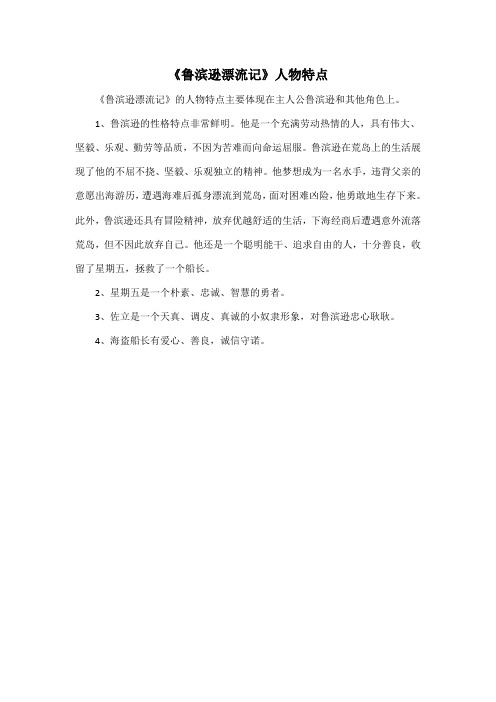
《鲁滨逊漂流记》人物特点
《鲁滨逊漂流记》的人物特点主要体现在主人公鲁滨逊和其他角色上。
1、鲁滨逊的性格特点非常鲜明。
他是一个充满劳动热情的人,具有伟大、坚毅、乐观、勤劳等品质,不因为苦难而向命运屈服。
鲁滨逊在荒岛上的生活展现了他的不屈不挠、坚毅、乐观独立的精神。
他梦想成为一名水手,违背父亲的意愿出海游历,遭遇海难后孤身漂流到荒岛,面对困难凶险,他勇敢地生存下来。
此外,鲁滨逊还具有冒险精神,放弃优越舒适的生活,下海经商后遭遇意外流落荒岛,但不因此放弃自己。
他还是一个聪明能干、追求自由的人,十分善良,收留了星期五,拯救了一个船长。
2、星期五是一个朴素、忠诚、智慧的勇者。
3、佐立是一个天真、调皮、真诚的小奴隶形象,对鲁滨逊忠心耿耿。
4、海盗船长有爱心、善良,诚信守诺。
(完整)Robinson Crusoe鲁滨逊漂流记人物分析
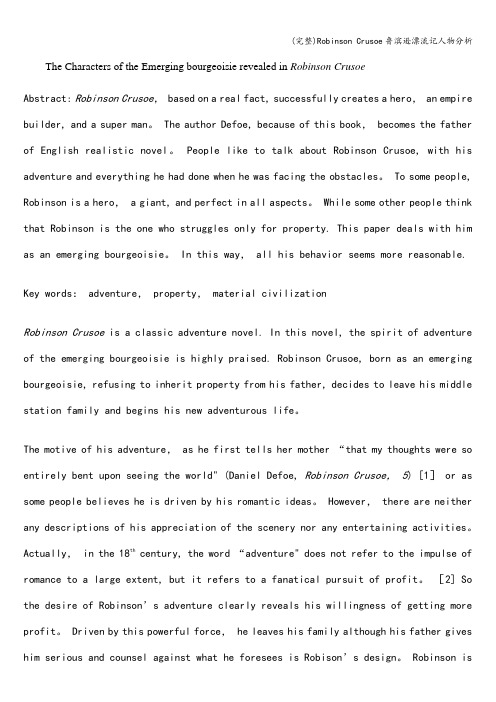
The Characters of the Emerging bourgeoisie revealed in Robinson CrusoeAbstract: Robinson Crusoe, based on a real fact, successfully creates a hero, an empire builder, and a super man。
The author Defoe, because of this book, becomes the father of English realistic novel。
People like to talk about Robinson Crusoe, with his adventure and everything he had done when he was facing the obstacles。
To some people, Robinson is a hero, a giant, and perfect in all aspects。
While some other people think that Robinson is the one who struggles only for property. This paper deals with him as an emerging bourgeoisie。
In this way, all his behavior seems more reasonable. Key words: adventure, property, material civilizationRobinson Crusoe is a classic adventure novel. In this novel, the spirit of adventure of the emerging bourgeoisie is highly praised. Robinson Crusoe, born as an emerging bourgeoisie, refusing to inherit property from his father, decides to leave his middle station family and begins his new adventurous life。
鲁滨逊漂流记的人物介绍
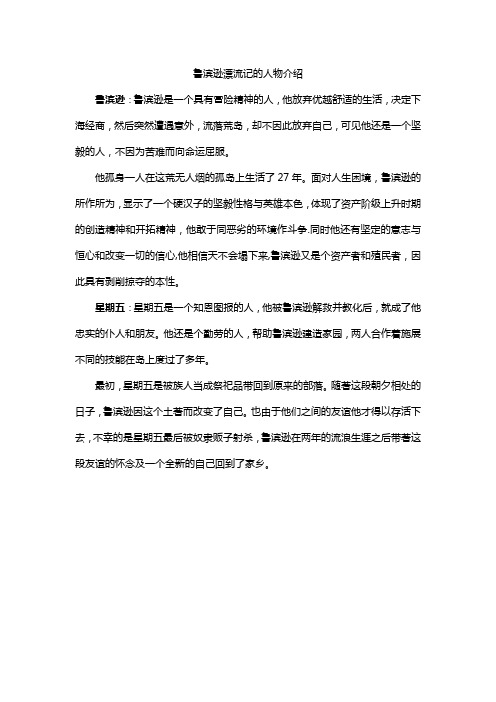
鲁滨逊漂流记的人物介绍
鲁滨逊:鲁滨逊是一个具有冒险精神的人,他放弃优越舒适的生活,决定下海经商,然后突然遭遇意外,流落荒岛,却不因此放弃自己,可见他还是一个坚毅的人,不因为苦难而向命运屈服。
他孤身一人在这荒无人烟的孤岛上生活了27年。
面对人生困境,鲁滨逊的所作所为,显示了一个硬汉子的坚毅性格与英雄本色,体现了资产阶级上升时期的创造精神和开拓精神,他敢于同恶劣的环境作斗争.同时他还有坚定的意志与恒心和改变一切的信心,他相信天不会塌下来,鲁滨逊又是个资产者和殖民者,因此具有剥削掠夺的本性。
星期五:星期五是一个知恩图报的人,他被鲁滨逊解救并教化后,就成了他忠实的仆人和朋友。
他还是个勤劳的人,帮助鲁滨逊建造家园,两人合作着施展不同的技能在岛上度过了多年。
最初,星期五是被族人当成祭祀品带回到原来的部落。
随著这段朝夕相处的日子,鲁滨逊因这个土著而改变了自己。
也由于他们之间的友谊他才得以存活下去,不幸的是星期五最后被奴隶贩子射杀,鲁滨逊在两年的流浪生涯之后带著这段友谊的怀念及一个全新的自己回到了家乡。
鲁滨逊漂流记英语作文分析人物性格特点

鲁滨逊漂流记英语作文分析人物性格特点全文共3篇示例,供读者参考篇1Robinson Crusoe: A Character AnalysisThe novel Robinson Crusoe by Daniel Defoe is a literary masterpiece that has captivated readers for centuries. At its core, the story revolves around the life and experiences of the protagonist, Robinson Crusoe, whose character traits and personal journey serve as a mirror reflecting the human condition. In this analysis, I will delve into the multifaceted nature of Crusoe's personality, exploring his strengths, flaws, and the transformative power of his experiences.One of the most striking aspects of Crusoe's character is his insatiable spirit of adventure and desire for exploration. From a young age, he harbors an unquenchable thirst for the unknown, defying his family's wishes and societal conventions to embark on a life at sea. This restless nature, while admirable in its pursuit of knowledge and self-discovery, also reveals a reckless disregard for consequences and a tendency towards impulsive decision-making.Crusoe's resourcefulness and resilience are put to the test when he finds himself shipwrecked on a deserted island. Faced with the harshest of circumstances, he exhibits an unwavering determination to survive. Through his ingenuity and practical skills, he constructs shelter, procures food, and adapts to his new environment. This ability to think critically and improvise in the face of adversity is a testament to his strength of character and his capacity for self-reliance.However, Crusoe's journey is not without its share of flaws and personal struggles. Early in his time on the island, he grapples with profound feelings of isolation, despair, and spiritual emptiness. His initial response to these challenges is marked by a sense of entitlement and a belief that his misfortunes are unjustly bestowed upon him. It is only through a gradual process of self-reflection and spiritual awakening that Crusoe begins to embrace a more humble and grateful perspective, acknowledging the grace of his survival and the beauty of his surroundings.One of the most complex aspects of Crusoe's character is his relationship with the indigenous inhabitants of the island, particularly his companion, Friday. While Crusoe initially views Friday through the lens of colonial superiority, regarding him asa servant or subordinate, their relationship evolves over time. Crusoe comes to recognize Friday's humanity, intelligence, and loyalty, ultimately forming a bond of mutual respect and friendship. This transformation reflects Crusoe's growing capacity for cultural understanding and his ability to challenge his own prejudices and preconceptions.Throughout his ordeal, Crusoe exhibits a remarkable capacity for adaptation and personal growth. His experiences on the island serve as a crucible, forging his character and refining his values. From a reckless adventurer driven by material ambition, he evolves into a more introspective and spiritually grounded individual, recognizing the true value of life's simple pleasures and the importance of gratitude.Ultimately, Crusoe's character arc is one of redemption and self-discovery. His journey from a shipwrecked castaway to a self-sufficient survivor and, eventually, a wealthy and respected member of society, is a testament to the resilience of the human spirit and the power of perseverance. Through his trials and triumphs, Crusoe emerges as a multidimensional and relatable protagonist, embodying both the strengths and vulnerabilities that define the human experience.In conclusion, Robinson Crusoe is a rich and complex character whose personality traits and personal journey offer profound insights into the human condition. His spirit of adventure, resourcefulness, and capacity for growth serve as inspiration, while his flaws and struggles remind us of our own imperfections and the transformative power of self-reflection and personal growth.篇2Robinson Crusoe: A Character Study"Robinson Crusoe" by Daniel Defoe is a classic adventure novel that has captivated readers for centuries. At its core, the book is a tale of survival and resilience, chronicling the experiences of a shipwrecked sailor who finds himself stranded on a remote island. However, beneath the surface lies a rich exploration of human nature and the complexities of the protagonist's character.Robinson Crusoe, the eponymous hero, is a multifaceted and dynamic character whose journey serves as a microcosm of human existence. From the outset, we are introduced to a restless and adventurous spirit, driven by an insatiable desire for exploration and a thirst for new experiences. This yearning forthe unknown ultimately leads him to embark on a fateful sea voyage that forever alters the course of his life.One of Crusoe's most remarkable traits is his unwavering determination and resilience in the face of adversity. When faced with the daunting prospect of surviving alone on a deserted island, he does not succumb to despair or self-pity. Instead, he channels his energy into building a life for himself, constructing shelter, procuring food, and adapting to his new environment. This indomitable spirit is a testament to the human capacity for perseverance and the ability to overcome even the most formidable challenges.As the narrative progresses, we witness Crusoe's transformation from a brash and impulsive youth into a contemplative and introspective man. Forced into solitude, he grapples with existential questions and undergoes a profound spiritual awakening. His relationship with God and his newfound faith become central pillars of his existence, guiding his actions and providing solace in his moments of despair. This spiritual dimension adds depth and complexity to Crusoe's character, showcasing the human capacity for growth and self-discovery in the face of isolation and hardship.Crusoe's encounter with Friday, the indigenous man he rescues and befriends, introduces another facet of his character: his capacity for compassion and his ability to transcend cultural barriers. Despite their vastly different backgrounds and beliefs, Crusoe extends a hand of friendship and endeavors to understand and appreciate Friday's culture. This openness to embracing diversity and fostering human connection serves as a powerful testament to the universal language of kindness and empathy.However, Crusoe is not without flaws. His initial arrogance and disregard for the advice of his elders hint at a streak of hubris that ultimately leads to his plight. Additionally, his treatment of Friday, while well-intentioned, can be viewed as paternalistic and reflective of the colonial mindset prevalent during the era in which the novel was written. These blemishes make Crusoe a more nuanced and relatable character, reminding us that even the most admirable individuals are not immune to the complexities and contradictions inherent in human nature.Throughout his ordeal, Crusoe displays remarkable ingenuity and resourcefulness. From fashioning tools and weapons to cultivating crops and domesticating animals, he demonstrates the human capacity for adaptation and the abilityto thrive in even the most challenging environments. His inventiveness and problem-solving skills serve as a testament to the resilience of the human spirit and the boundless potential for innovation when faced with necessity.In the end, Robinson Crusoe's journey is not merely a tale of survival but a profound exploration of the human condition. Through his trials and tribulations, we are invited to contemplate our own capacity for resilience, spiritual growth, and the pursuit of self-discovery. Defoe's masterful characterization of Crusoe offers a lens through which we can examine the complexities of human nature, the enduring power of hope, and the inextinguishable drive to persevere in the face of seemingly insurmountable odds.篇3Robinson Crusoe: A Character AnalysisRobinson Crusoe, the protagonist of Daniel Defoe's classic novel, is a complex and multifaceted character whose experiences and personal growth have captivated readers for centuries. Through his harrowing journey of shipwreck, survival, and eventual triumph, Crusoe's character undergoes a profoundtransformation, revealing traits that both inspire and challenge us as readers.At the outset, Crusoe is portrayed as a restless and adventurous young man, driven by an insatiable desire for exploration and a disregard for societal conventions. His decision to embark on a seafaring life against his father's wishes speaks volumes about his stubborn nature and his willingness to defy authority in pursuit of his dreams. This impulsive and rebellious streak, while admirable in its pursuit of freedom, also foreshadows the challenges he will face as a result of his reckless choices.However, it is in the aftermath of the shipwreck that Crusoe's true character begins to take shape. Stranded on a deserted island, he must confront the harsh realities of survival and rely solely on his wits and resourcefulness. It is here that we witness his remarkable resilience and adaptability, as he meticulously documents his progress, learns new skills, and finds ingenious ways to meet his basic needs. Crusoe's determination and work ethic are truly inspiring, as he transforms the island into a livable environment through sheer force of will and perseverance.Yet, beneath his practical achievements lies a deeper struggle – a battle between his rational, pragmatic side and hisprofound sense of spirituality. Crusoe's religious convictions, instilled in him from an early age, surface repeatedly throughout his ordeal, leading him to engage in intense introspection and self-examination. His moments of spiritual awakening and repentance reveal a vulnerability and humility that contrast starkly with his earlier displays of arrogance and defiance. This inner conflict between his earthly desires and his search for divine guidance adds depth and complexity to his character, making him a multidimensional figure with whom readers can empathize.Crusoe's encounter with Friday, the native he rescues and befriends, further highlights his evolving character. Initially, he exhibits a sense of superiority and paternalism towards Friday, reflecting the colonial attitudes of his time. However, as their relationship develops, Crusoe begins to recognize Friday's inherent humanity and intelligence, ultimately treating him as an equal and a companion. This transformation speaks to Crusoe's capacity for growth and his ability to transcend the prejudices of his era, showcasing his openness to learning and personal development.Throughout his ordeal, Crusoe's resourcefulness and ingenuity are consistently on display. From constructing sheltersand tools to cultivating crops and domesticating animals, his ability to adapt and innovate in the face of adversity is truly remarkable. This practical, problem-solving mindset not only ensures his physical survival but also serves as a metaphor for his mental and emotional resilience, as he navigates the challenges of isolation and self-discovery.Ultimately, Crusoe's character arc is one of profound transformation. He begins as a restless and impulsive youth, driven by a thirst for adventure and a disregard for societal norms. Through his harrowing experiences on the island, he is forced to confront his own flaws, adapt to harsh realities, and ultimately emerge as a more introspective, resilient, and enlightened individual. His journey is a testament to the human capacity for growth, perseverance, and personal redemption, making。
- 1、下载文档前请自行甄别文档内容的完整性,平台不提供额外的编辑、内容补充、找答案等附加服务。
- 2、"仅部分预览"的文档,不可在线预览部分如存在完整性等问题,可反馈申请退款(可完整预览的文档不适用该条件!)。
- 3、如文档侵犯您的权益,请联系客服反馈,我们会尽快为您处理(人工客服工作时间:9:00-18:30)。
[鲁滨逊漂流记人物性格分析]专业:[英语专业] 班级:[英语1班]学生姓名:[**]指导教师:[**]完成时间:2022年4月27日An characteristic analysis of Robinson Crusoe Upon Robinson CrusoebyHu XueUnder the Supervision ofAssociate Prof. Niu MinA thesis submitted as partial requirement forThe final exam Guizhou Minzu UniversityGuiyang, Guizhou, ChinaJuly 2nd, 2015Contents Abstract (1)Ⅰ.Introduction (1)1.1.The back ground of work (1)1.2. The theory of Text Analysis (2)1.3. Introduction of the whole story and Daniel Defoe (2)Ⅱ.Literature Review (4)2.1. The present study of foreign scholars (4)2.2. The Significance of the research (4)Ⅲ.The analysis of the character of Robinson Crusoe (5)2.The positive aspects of the character of Robinson Crusoe (5)2.1 The character of determination (5)2.2. The character of individualism (5)2.3. The character of kindness (5)2.4. The character of hard working (6)2.5. The character of wisdom (6)3.The negative aspects of the character of Robinson Crusoe (6)3.1. Robinson Crusoe pays little attention to his family (6)3.2. Robinson Crusoe is vain (7)3.3. Robinson Crusoe likes to keep slave (7)4.The subtle psychological description (8)V.Conclusion (8)VI .Bibliography (9)An characteristic analysis of Robinson Crusoe upon Robinson Crusoe[Abstract]Robinson Crusoe, the renowned works written by Daniel Defoe, is the popular hero story in America. It is known to all that a man named Robinson Crusoe lives in a uninhabited island where is nothing just wild animal and uncertain future over twenty years. However, he gets over any dangers and final goes back. It is a sort of encouraged story to help people to go well in their lives. Daniel Defoe was an English trader, writer, journalist, pamphleteer and spy. He wrote more than five hundred books, pamphlets and journals on various topics (including politics, crime, religion, marriage, psychology and the supernatural). He was also a pioneer of economic journalism. This essay is mainly to discuss Robinson Crusoe. The first part is to introduce the background of Robinson Crusoe,the famous writer Daniel Defoe,and the whole story. And at the second part, it is introduced to the character analysis of Robinson Crusoe.At the end of part ,it is mainly to do a conclusion for the whole essay.Key words: character; analysis; psychologyⅠ.Introduction1.1.The background of WorkRobinson Crusoe is the main representative work of the father of the American novel,Daniel Defoe.This novel is the most popular in his works.The book is based on a true story.In September 1704, a man named Alexander Selkirk, is a Scottish sailor due abandoned in South America by the captain due to the conflict with captain in the Atlantic Ocean the amphion South Devon Island, he spent four years and four months on the deserted island.In February 12, 1709, a American pulled him away from the island.Defoe was inspired by this,and write down the famous work.1.2. The Theory of Text AnalysisFrom the surface of the text to the depth of the text, text analysis refers to find out the deep meaning of the ordinary reading. There are three major methods used when do an analysis of a work----"New Criticism",Symbolic analysis,and Narrative analysis."New Criticism" is not only the basis of the method, but also very practical. That is to say,it is to do " detail read"from text in the language of the non daily use, such as "irony", "tension" . "Reading" has now become a basic skill during the text analysis."New Criticism"is very useful towards poetry ,short stories and text analysis, but for the novel, it is hard to express. With the help of narrative analysis ,it is easy to concentrate on the main points.Semiotics is actually a very broad concept, it refers to the most classic ,which is the most commonly used semiotic analysis method----Greimas's method, including matrix analysis and dynamic analysis. Of course, Roland Bart and Todorov come up with many other methods, however, whatever methods has the basic principle. The so-called "structural" analysis method is similar to this.Narrative analysis is mainly the story analysis, which is including Story sequences analysis, story type analysis, and analysis of narrative perspective, including the narrator's person, location, credibility; the voice of the narrator, narrative speed. Of course, narration is equally concerned about the characters of discourse analysis,it is said to the direct speech and indirect speech and free indirect speech. Because narrative semiotics are established on the basis of linguistics. Therefore, analyzing a novel like analysis of a sentence, equivalent of the characters in a subject, action figure, is equivalent to the predicate, and characters of quality is the equivalent of the attributive or adverbial.1.3. Introduction of the Whole Story and Daniel DefoeThe personal and typical imagine called Robinson is successfully created by Daniel Defoe. Robinson lived in a separated island for 28 years, after overwhelming all kinds of troubles, creating the wonderful legend of life, showing us the shining spots on his characters: breaking down current situation, following his heart to meet uncertainthings, making use of intelligent and doing well with labor and faithful.Robinson born a good middle-class family, his parents is Protestants,and devote to turn Robinson into a churchman in order to live without any sorrow. Yet Robinson always refuses the arrangement from his family for the irresistible power in the deepest mind because he want to go abroad to horizon his eyes. He runs away without any words to his parents. The first voyage, he suffers from big storm so that the ship is devoured by ocean, for the God blessing, he survived at this disaster. The second trip, he fortunately earned sums of wealth. On the contrary with second trip, he was caught by Moors, had the changing identify of himself,he became Moors’slaves. He pretended to follow master’s mind if an order is told, finally, the silly master trust him and more and more freedom are allowed. At a proper moment , he stolen ships of Moors,and get the help from the capital in a Spanish ship, in addition ,he had a good relationship with the kind and honest capital. After arriving Brazil, Robinson had the right for a manor for he bought it before. However, the steady condition can’t satisfy his desire, he went abroad again to do business of slaver. But this trip is out of his control, he suffers the great storm ,and is boxed up in a inhabited island, everything goes wrong, no house, no food, no clothes,no safety and what’s the worst, his body doesn’t work as usually. In this moment, the words “damn it”maybe express the feeling. If i am in that kind of worst condition, i would do died rather to face the unpromising future. To reader’s surprise , or not (serve for the plots), Robinson get up ,and create necessary goods. First step, to carry everything from the died ship support the basic want. There are the things, powder, wine , a little food, some of clothes and some tools, even pieces of the ship. What’s more, he create another food just like bread cooked with man-made and rough vessel. And a cave is as the house he live in order to protect himself from the wild animals and over-changing climate. Times goes so fast, 17years is over. Everything goes as Robinson’s mind. But the print of unknown human or inhuman came to his life. Mess of thoughts are full of his mind, and he couldn’t ignore it. One day , he found the truth that the print is left by several savages. By accident, he saved a wild man ,and named him Friday. This is the second part of this books.The third part of Robinson Crusoe, it is mainly related to the experience when he went back.Ⅱ.Literature ReviewThe representative work of Daniel Defoe,Robinson Crusoe,is constantly studied since its publication in 1719, for four hundred years, the domestic and foreign scholars have never stopped to pay attention to this work.2.1. The Present Study of Foreign ScholarsThe aspect of the works of the later writers and the influence of the readers. Shown Thomson ,the student of the University of Kansas,writes a doctoral dissertation in 2006: Fortress of American Solitude:Crusoe Topos in Nineteenth-Century American[1], the author holds that the 19th century American Fiction in the plot structure follows The adventure rich traditional theme of the Robinson Crusoe,which also has the big influence to the young people.An interpretation of the vision of the colonial and Post Colonial.To this kind of understanding is most obvious at the State University of New York at Edward Jonathan's master's thesis: “I Made Him Know His Name Should Be Friday”:Naming and Sexuality in Robinson Crusoe and Foe[2]. And Wolfram Michael Schmidgen ‘s master’s thesis: Possessive Worlds: Communities of Persons and Things in Eighteenth-Century British Fiction[3]. Edward thinks that Robinson is a typical male centrism and Eurocentric. According to Lacan's theory of psychological development model, author considers that the protagonist on the island, both to people or objects named are trying to avoid and women, by naming animals and plants and civilize the natives and put an end to contact with the female.2.2. The Significance of The ResearchCriticst do a study towards Robinson Crusoe from a multi angle, multi-level research, whether it is Robinson himself, or other characters,such as Friday. The purpose of this paper is from the positive aspects and negative aspects of the Robinson in Robinson Crusoe, and tries to sort out the character image of the works Lee Robinson the living is how to describe.Ⅲ.The Analysis of The Character of Robinson CrusoeThe purpose of this paper is from the positive aspects and negative aspects of the Robinson in Robinson Crusoe, and tries to sort out the character image of the works Lee Robinson the living is how to describe.2.The Positive Aspects of the Character of Robinson Crusoe2.1 The Character of DeterminationRobinson was born in a middle-class family, his parents ,the Protestants. He was arranged to obey the fate and became a lawyer. But the young man always want to brake out this, and to be a sailor. 19 years old, he runs away from, and begins his way to take adventure on a sea. In spite of many perils and adventurea on the sea, he never give up. It has been mentioned that the urge of seeking after the sea is the only aims for Robinson.2.2. The Character of Individualism.Defoe was born in a turbulent age, and the class was ignoring by nobility, and there was no huge wealth or relics from generations. The way to shining himself is to struggle and perfect himself to go upper. So the hero figure doesn’t come out by chance. Defoe sets his merits to the figure . The ideals of enlightenment endowed Robinson some progressive characters. The life of following his own heart and valued individual is coming and doing all the time. While in the middle age , human took the god as the core. Robinson was not willing to stick to the old doctrines and lived a life of leisure and ease. “my head began to be filled very early with rambling thoughts:my father, who was very ancient, had given me competent share of learning...and designed for the law, but I would be satisfied with nothing but go to sea...”His restless nature made him always fight for a better life and the things he wanted to possess: he went out to sea three times to do business, even after he had established his plantation in Brazil.2.3. The Character of KindnessFor this point, he has won people’s concern, respect and best wishes. We can find it between the lines of the book. He is really performing well. For example, when hefound that the savage wretches had come o the island to hold an inhuman feasting upon the bodies of their fellow creature, he was so astonished and filled with horror. From then on, he always thought about how he could destroy some of these monsters in their cruel bloody entertainment,and if possible, save the victims they brought to eat. He saved one victim, named Friday by him, who became a true and faithful companion later.2.4. The Character of HardworkingRobinson had shown his marvelous capacity for work, his boundless energy and persistence in overcoming obstacles. The realistic account of the successful struggle of Robinson single handedly against the pitiless forces nature makes up the best part of the novel. His perseverance in spending months making a canoe, and in practicing pottery making until he got it right, are praiseworthy. Additionally, he resourcefulness is in building a shelter, dairy.2.5. The Character of WisdomAfter the shipwreck in Robinson’s third voyage , he managed to land on the isolated island. Thanks to the education he received in the modern society and the goods he luckily got from the wrecked ship , especially the tools for production , he could then live on the island and remark it at his own will. When facing difficulties , Robinson not always prayed for the God’s blessing but used his wisdom and tools to fight all the obstacles off, and created a necessary and comfortable life for himself. He used full of his knowledge and learned more. In a word, believing that human could bend nature to his will by his wisdom and hard working, instead of relying on God, Robinson changed his miserable life.3.The Negative Aspects of the Character of Robinson CrusoeJust like the old saying goes, “coin has two sides.”. Robinson Crusoe also has his shortcoming in his character.3.1. Robinson Crusoe pays little Attention to his FamilyIn order to realize his dream, Robinson left his family, not considering much about the feeling of the family. As he told us, “I would be satisfied with nothing but go tosea, and my inclination to this led me strongly against the will, nay the commands of my father, and against all the entreaties and persuasion of my mother and other friends.” In the end he went out to sea without saying goodbye to his family. This , to me, is irresponsible, especially in modern society.3.2. Robinson Crusoe is VainRobinson Crusoe also had a sense of sense of vanity and weakness. After the first sea voyage failed, he had the thought of going home, shame opposed the action, “it occurred to me how I should be laughed at among the neighbors, and should e ashamed to see, not my father and mother only, but even everybody else.”On this point, I don’t agree with Robinson, for his so strong a sense of vanity. What is more, sometimes he was dull and lacking prediction of the results. Once he had an ideal plan to make himself a canoe, one big enough to have carried him and all his cargo. He thought it possible and easy, but interested in possessions, power and prestige. After the island was peopled, it turned out to be a mad plan and unlikely to be performed: he simply couldn’t think he was “very rich in subjects”, and he thought it was a “merry reflection” that “how like a king I looked.”he thought the whole country was my own.3.3. Robinson Crusoe likes to Keep SlavesDue to Robinson’s bourgeoisie outlook, he did have some limits of the bourgeoisie. For example, he supported slavery and thought it was a profitable trade. He was ridiculous on this point, that is, he who belie that man was born free and equal was even eager to own some slaves and direct them at his will. After many years of living on the island, he set to get one of those savages into his hands, the slave is called “Friday”. The first word he taught to Friday is “Master”even before teaching him the words “yes”and”no”,and let he know tha twas to be his name.4.The Subtle Psychological DescriptionThere are several description to the characters of Robinson. For example, the thoughts when he had illness firstly shows sickness can’t put him to the hell. On the condition of no medicine, serious weakness and no one with him,, the weakest body can’t make him to eat or drink, and in order to survive, he uses the tobacco to curehim whether it is useful for him. This is the nature of life. Suffering so serious pains from bodies, he got over and then got the experiences from what he gone. That is say, he is a man of never yield to anyone.What’s more, it is so impressed on me to the subtle psychological description. Just as the description, “In the middle of these cogitations ,apprehensions and reflection, it came into my thought one day, that all this might be a meer chimera of my own......and that if at last this was only the print of my own foot, I had played the part of those fools, who strive to make stories of spectres, and apparitions;and then are frightened at them more than anybody.” and the description, “As for the way which I proposed to myself to go in and out, for I left no avenue; it was by setting two ladders one to a part of the rock which was low, and then broke in ,and left room to place another ladder upon that...”. It is easily known that the character of Robinson is scrupulousness, thought out.Ⅳ.Conclusion:The whole essay is mainly talking about the content of Robinson Crusoe, which is a hero story and a sort of encouraging story, the analysis of Robinson Crusoe, the introduction of Daniel Defoe and awesome sentences and phrase which give the space to think over. I learned a lot of from the solution way when suffering sorrows--- just make a list for evil and good. There are not the end of the world, to hold a positive attitude to the world , the fate isn’t out of your control. To be, or not to be; that is a question. To be alive means to be care for yourself. The master of your fate is only you. What’s more, don’t put eyes on the currents, the world can give different and wonderful things to you. Different scenery will lead you to feel the magic of nature. And the diversities of natural or regional culture will attach your heart and guide you to touch the breath of country. The things what happen to you will change your mind and refresh yourself. So just to travel, if you’re boring for your current state.Reference:[1]Shawn, Thomas:Fortress of American Scolitude: the Crusoe Topos in Nineteenth-century America[D] University of Kansas,2006.[2] Jonathan, Edward “I Made Him Know His Name Should Be Friday”:Naming and Sexuality in “Robinson Crusoe” and “Foe”[D] State University of New York,2009.[3] Schmidgen, Wolfram Michael.Possessive Worlds:Communities of Persons and Things in Eighteenth-century British Fiction[D] The University of Chicago,1997. [4]Defoe,D. Robinson Crusoe[M].中国宇航出版社,2011年.。
